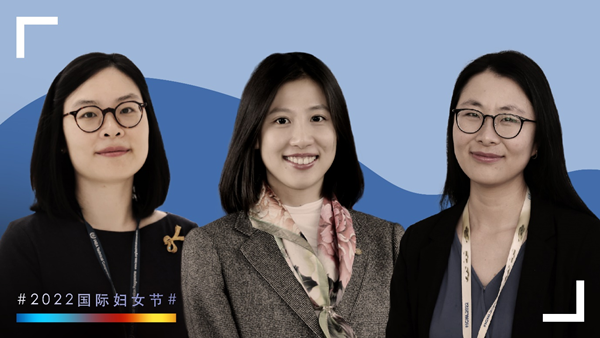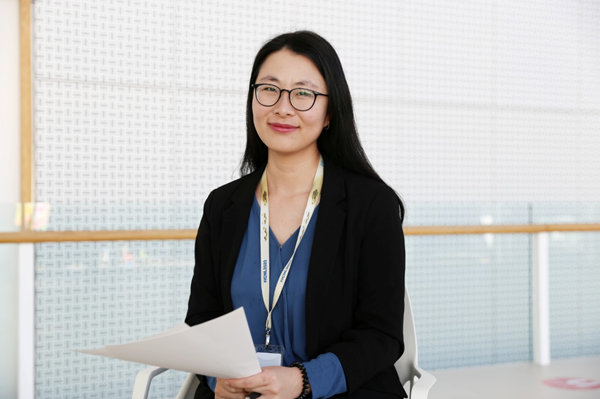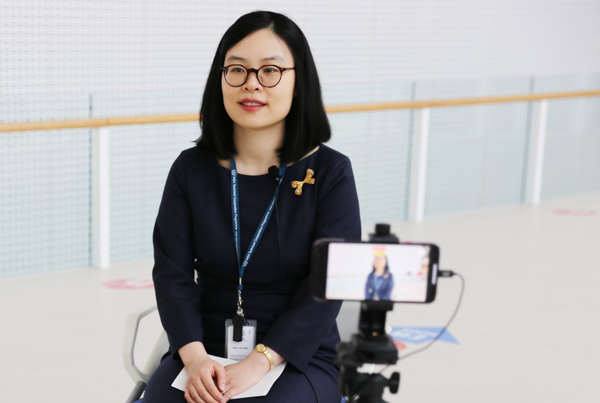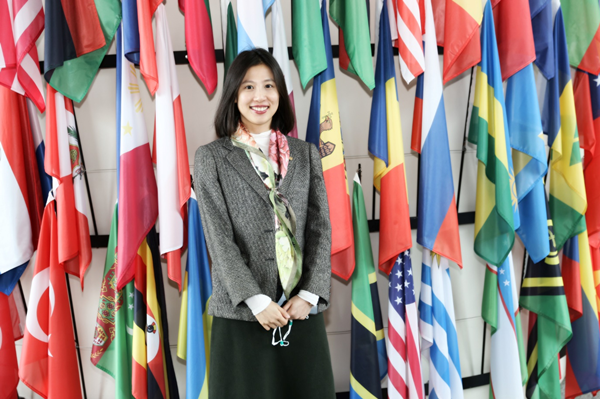International Women's Day: Meet 3 young CNNC professionals working at the IAEA

Meng Li, Li Zhang and Chenchen Liang (left to right) – three young professionals currently working at the IAEA. (Graphic: A. Vargas /IAEA)
To mark International Women’s Day, three young professionals from China, Chenchen Liang, Meng Li, and Li Zhang share their experience on working at the IAEA, talk about gender issues in the fields of science, technology, engineering and mathematics (STEM), and give career advice to young women.
With their contracts funded by the Chinese government, these young women started their journeys at the IAEA through the Junior Professional Officer Programme in 2020. They are currently working in the Office of Legal Affairs, the Department of Technical Cooperation, and the Department of Management at the IAEA in Vienna.
Working at the IAEA

Chenchen Liang, Associate Legal Officer in the Nuclear and Treaty Law Section of the Office of Legal Affairs. (Photo: A.Tarhi/IAEA)
“Working at the IAEA is challenging and rewarding. My main responsibility is to work in the area of nuclear law, especially focusing on nuclear liability, and support the IAEA Legislative Assistance Programmes to Member States, including conducting awareness missions, law reviews, organizing bilateral, regional and inter-regional workshops. I have also participated in new projects, such as developing and conducting live topical webinars and developing e-leaning modules on nuclear law-related topics for the government official globally. I’m proud to be able to serve Member States under the IAEA mandate through my work,” says Liang, Associate Legal Officer in the Nuclear and Treaty Law Section, “after participating in diverse projects and meeting many talented professionals, I realize the importance of keeping learning and enriching your solid expertise in the relevant fields to better serving the Agency and stay competitive.”

Meng Li, Associate Project Officer in the Division for Europe of Department of Technical Cooperation. (Photo: A.Tarhi/IAEA)
“I’m responsible for the management of technical cooperation (TC) programmes, which are a key mechanism for supporting countries to use of nuclear science and technology to address major sustainable development priorities,” says Li, associate project officer of the Technology Cooperation Department, “working at the IAEA allows me to meet people from around the world with various backgrounds and skills. For example, when I was working to assist in the development of the country programme framework (CPF) for Pakistan, I needed to communicate and coordinate with the Pakistan agencies and various departments within the IAEA. This helps me to improve my interpersonal and communication skills which are crucial for working in a multi-cultural environment, as well as working with multi-stakeholders.”

Li Zhang, associate recruitment officer in the Human Resources Division of the Department of Management. (Photo: A.Tarhi/IAEA)
“Working at the Human Resources (HR) Division, I’m in charge of the full recruitment process of the Agency’s internship programme, as well as the talent outreach and some recruitment-related cooperation,” says Zhang, associate recruitment officer, “the Agency recruits over 100 interns around the world every year, and my advice to aspiring candidates is to have a very high command of languages if they would like to start their careers at the United Nations. Being fluent in English or French is a must. During the interview, we also examine whether the interviewees can communicate fluently, concisely, and correctly.”
Why the IAEA is different?
“At the IAEA, you can see more and more women from diverse backgrounds both at junior or senior levels,” says Liang, “and during the past few years, the Agency has been taking concrete steps to increase the representation of women in the IAEA.”
“In the STEM fields, there is a stereotype of men having advantages over women. As a result, women may not receive the same opportunities as men when competing for jobs. It may take longer to eliminate this stereotype,” says Li “but I have already seen positive changes taking place, especially in international organizations.”
The IAEA’s commitment to gender equality
“The IAEA has committed to achieving its gender parity goal in the Agency by 2025. The HR division has already been taking concrete steps for achieving this goal,” says Zhang, “for example, in our global recruitment for the professional staff, we will build a talent development strategy based on the requirements of the position to attract more qualified women as well as professionals from underrepresented countries to join the Agency.
“We are also implementing gender mainstreaming in our programmes and activities,” says Li, “we provide guidelines and training to countries on gender equality.”
The IAEA launched the Marie Sklodowska-Curie Fellowship Programme in 2020 to provide highly motivated women students with scholarships for Master’s programmes and an opportunity to pursue an internship facilitated by the IAEA.
Advice for young women: be brave and keep improving your skills
“Many young women who are interested in STEM are afraid of it being too difficult for them,” says Liang, “don’t be afraid, be brave and confident to take the first step. Often, having the courage to do something already makes you halfway there.”
“For those who want to start a career at the UN, keep an eye on the UN programmes targeting the young people, such as the JPO programme and the Young Professional Programme (YPP). Besides, keep improving your language skills and practicing your professional skills in the relevant fields,” adds Li.
“Know your strength and limits, and then work on that. At the same time, learn to cultivate your confidence. Competence with confidence can bring your career further,” concludes Zhang.
- China Institute of Atomic Energy
- Nuclear Power Institute of China
- Southwestern Institute of Physics
- China Nuclear Power Operation Technology Corporation, Ltd.
- China Nuclear Power Engineering Co., Ltd.
- China Institute for Radiation Protection
- Beijing Research Institute of Uranium Geology (BRIUG)
- China Institute of Nuclear Industry Strategy (CINIS)
- China Nuclear Mining Science and Technology Corporation


